Should I Drink A Protein Shake After Cardio?
Author:
Unlock your full potential by engaging with our experts and community! Have questions about your fitness journey or looking for expert advice on weightlifting techniques? Don’t hesitate — leave a comment below and Oleksandr Maksymenko will provide a personalized answer and insights to help you reach your goals.
Torokhtiy is reader-supported. Some links are affiliate links, and we may earn a commission at no extra cost to you. See our disclosure page for details.
Many connoisseurs of cardio training often ask one question: “Should I drink a protein shake after cardio”? Is it necessary to do this, or drinking the shake in another part of the day will have the same benefits? From this article you will get the answers to all key questions related to drinking protein after cardio.
Should you drink protein after cardio depends on your personal preferences, your overall distribution of total protein throughout the day, gastrointestinal tolerability, and some other factors. Although this is not a mandatory recommendation, drinking protein after cardio will not hinder, but rather contribute to the achievement of your fitness goals.
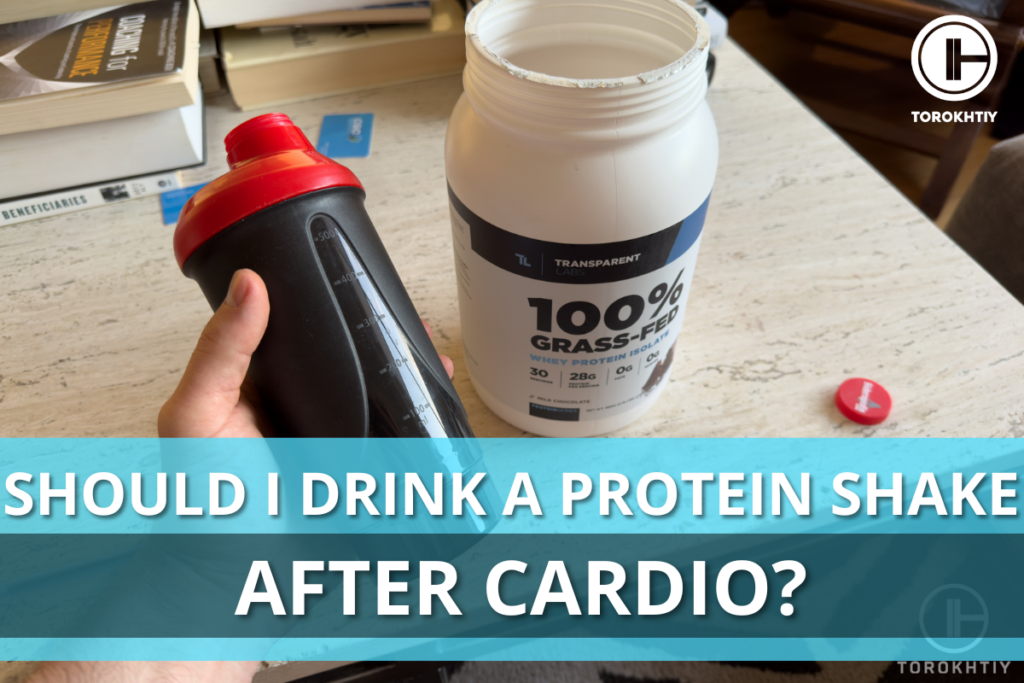
4 Reasons Why You Should Drink Protein Shakes After Cardio
In fact, the timing of protein intake relative to your training sessions is overrated, because in the hierarchy of importance the highest position belongs to meeting the total daily intake of protein and an even distribution of protein between meals. However, this does not mean that there is no benefit to eating protein after your aerobic workouts. Let’s list several reasons to use protein after cardio.
1. If You Train in a Fasted State
It was said above that timing is highly overrated. However, one scenario can be singled out, when timing can still matter. If you train in a fasted state (after a night’s sleep), or if it’s been more than ~3-4 hours since your last meal, taking protein soon after training can have benefits in the context of muscle recovery and optimization of muscle growth. If you are also engaged in strength training and want to optimize the process of maintaining and/or building muscle, this strategy can pay dividends.
2. Covering the Daily Need for Protein
According to the latest edition of the NSCA’s Guide to Sport and Exercise Nutrition, the protein requirements for people engaged in aerobic exercise are at least 1-1.6 g per 1 kg of body weight. If it is difficult for you to meet your daily protein needs from whole foods only (for example, if you consume protein at the upper range of the above recommendations), a protein on cardio days in a form of shake after training will only facilitate the process of obtaining the required daily amount of protein.
3. Enhancing Recovery After Cardio Sessions
Not only strength loads lead to increased muscle protein synthesis, but also endurance training. Consuming a serving of protein after a grueling endurance workout will allow you to maximize postexercise rates of muscle protein synthesis, which will have a positive effect on the overall recovery process and muscle remodeling.
Also, consuming protein after intensive bouts of endurance training can reduce muscle soreness.
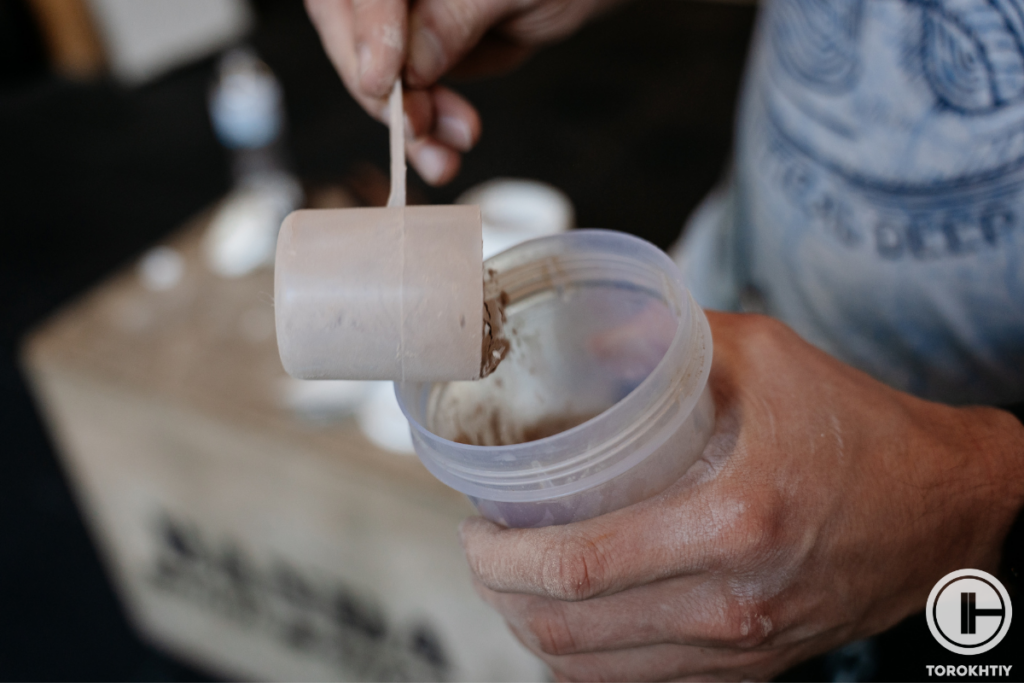
4. Reduction the Interference Effect From Concurrent Training
Many athletes combine strength training and cardio either in a single session, or at separate sessions on the same day, which is known as concurrent training. However, in the conditions of combining strength training with cardio training, frequent and long cardio sessions can negatively affect muscle hypertrophy, strength and power.
Especially if your type of cardio is running, which can have a more negative impact on strength development than cycling.
A serving of protein after combined strength and cardio training may reduce the potential interference effect of prolonged cardio on muscle hypertrophy. Therefore, protein on cardio days after aerobic sessions can be an important part of your routine, if your primary goal is to build or at least maintain muscle mass and strength.
And if you do both strength and aerobic training in conditions of energy deficit (during cutting), your daily protein needs may be significantly higher than 1.6 g / 1 kg of bodyweight.
For example, resistance-trained athletes trying to maintain muscle mass while losing fat and doing both strength and cardio training may need 2.2 g of protein per 1 kg of body weight or even more. In this case, protein shakes after cardio can be an important part of your routine.
After all, this will facilitate the process of getting your relatively high daily protein requirement.
3 Tips for Choosing the Best Whey Protein After Cardio
Whey protein powders are one of the most popular dietary supplements out there, and for good reason. To choose the best product for you, pay attention to several important factors.
1. Specific Type of Whey Protein
Depending on the method of processing and degree of filtration, whey protein powders are divided into the three main types:
- Concentrate
- Isolate
- Hydrolysate
Whey protein concentrate is the least processed form and is best for those who do not have problems with lactose. The isolate goes through additional filtration methods, after which there is zero to very low lactose in the final product, so it is better suited for people with severe lactose intolerance. Hydrolysate is a form of whey protein that was hydrolyzed, or pre-digested, which means that the protein was broken down into peptide chains or individual amino acids.
The best value for price per serving, protein-by-weight ratio, and gastrointestinal tolerability is whey protein isolate. However, if the concentrate contains added lactase enzyme, then this product is also a suitable option for those with lactose intolerance. available). It also happens that some people with lactose intolerance do not feel discomfort even after whey protein concentrate. So you will have to experiment (for this, it is best to buy the smallest package).
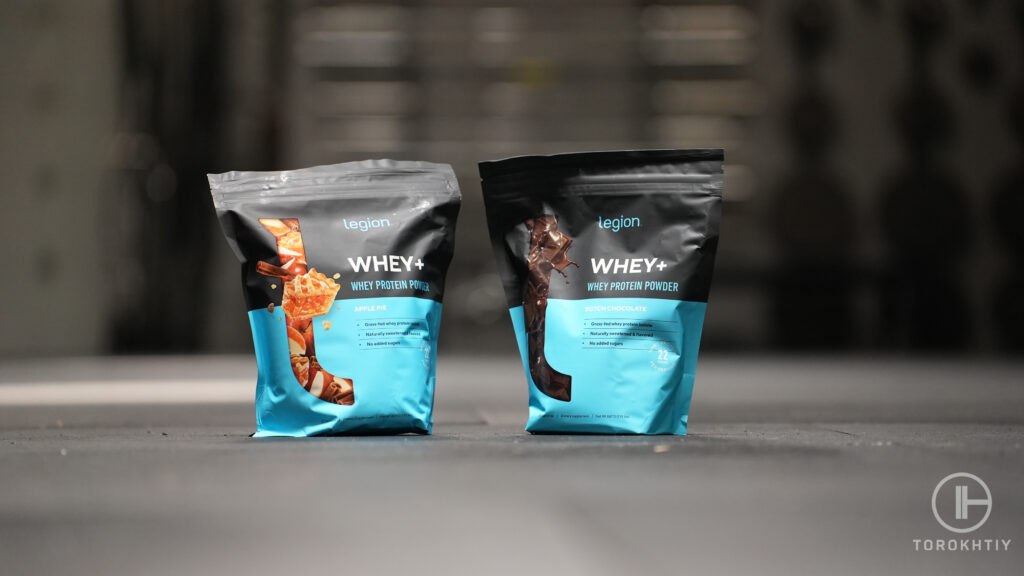
2. Gastrointestinal Tolerance
This factor is closely related to the previous one. Consider your individual tolerance and gut feeling. If a specific product causes bloating, pain, discomfort, and especially diarrhea, then it can be replaced with a similar product from another manufacturer or even changed to plant-based protein.
Keep in mind that the possible gastrointestinal problems are not always in the protein itself, as additional ingredients contained in the protein (for example, stevia or Monk Fruit) can also cause bloating, gas and diarrhea.
For these reasons, it is difficult to predict whether a particular product will cause GI distress in a particular person. So once again, a smart decision would be to buy the smallest package to assess tolerance. And if you’ve already tried many different whey proteins and each of them has caused problems, consider plant-based powders.
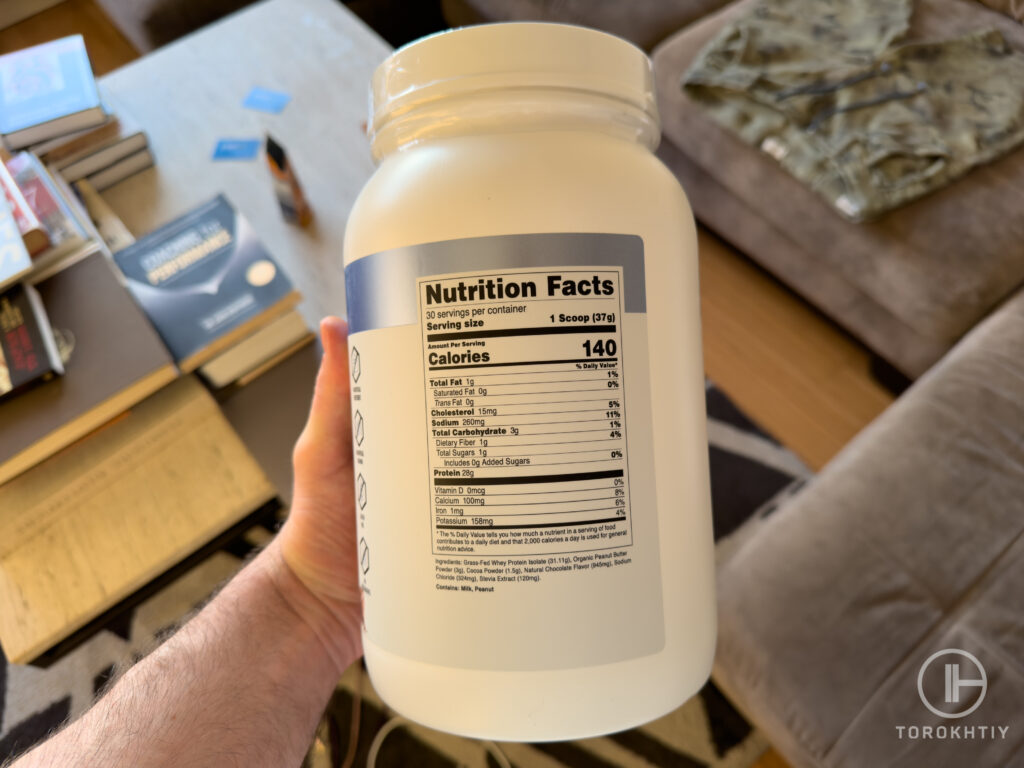
3. Macronutrients Breakdown
Choose products with the highest protein-by-weight ratio. That is, the more grams of protein relative to the total portion of the powder (in grams), the better!
Depending on your goal (gaining muscle, losing weight), you may be better off with a protein with more or less carbs and fat per serving. If you’re cutting, look for a product with at least 25g per serving, 0 to 2g of carbs, 0 to 2g of fat, and up to 120 calories per serving. If you don’t need to minimize the carbs and fat from your protein powder, you can choose a product with more carbs and fat.
Huge Whey Protein Powder
- Diet Type (best for): Build muscle, recovery, weight loss
- Suitable for Vegans: No
- Protein Source: Whey Protein Concentrate and Whey Protein Isolate
- Servings per Container: 30
- Serving Size: 31g
- Price per Serving: ~$1.50
- Protein-by-Weight Ratio (%): 74%
- Protein: 23.5-25g depends on flavor
- Carbohydrates: 2.5g
- Fat: 2g
- Added Sugar: 0g
- Calories per Serving: 130-150 depends on flavor
- Company Founded: 2019
- Recommended by Athletes: Joseph Shulkin, Brandon Harding
HUGE Supplements created a blend of whey protein concentrate and isolate, adding lactase enzyme to the general mix. The addition of lactase makes this product suitable for people with lactose intolerance, even despite the presence of whey concentrate as the main source of protein.
A serving of HUGE WHEY will provide you with 23.5-25.5 grams of the highest quality protein with a high concentration of BCAA.
Among the added benefits is a much lower amount of sodium per serving compared to most proteins on the market. Overall, this product is a great option for fitness enthusiasts, especially if you’re looking to gain muscle mass. With 6 flavors to choose from, you’ll have no problem finding something special for your taste buds.
Are There Any Drawbacks of Drinking a Protein Shake After Cardio?
If protein shake after an aerobic training session causes GI distress, this is a real reason to stop drinking these post-workout shakes. One of the main reasons may be the redistribution of blood flow from the organs of the gastrointestinal tract to the working muscles during strenuous exercises.
Although this phenomenon, known as “exercise-induced gastrointestinal syndrome”, is more relevant to long-distance runners, any intense physical activity redistributes blood to the skeletal muscles, and may set the stage for potential gastrointestinal problems, if you eat food during or immediately after physical activity.
Therefore, if your cardio sessions are long and/or strenuous, this may increase the risk of unpleasant symptoms from eating a meal right after the workout, and drinking protein after cardio is no exception. It is better to wait at least half an hour or more before consuming food or a shake.
FAQ
Should I Better Drink Protein Shake Before or After Cardio?
Meeting the total daily needs for protein is the most important factor, so it depends on your personal preferences and gastrointestinal tolerance.
How Long After Cardio Should You Drink a Protein Shake?
It again comes down to your personal preferences and gastrointestinal tolerance. Remember that consuming a shake immediately after a workout can cause or exacerbate GI symptoms. However, it can be individual, so it is worth experimenting.
What Should Your Post-cardio Protein Shake Include?
General public and fitness enthusiasts can mix protein powder with just water, or add milk, banana/berries and other ingredients. Choose ingredients depending on your taste preferences, taking into account your goal (losing weight, maintaining weight, gaining muscle mass) and caloric budget.
If you are a professional athlete who has 2 intense training sessions in one day and you use a protein shake after the first workout, it is recommended to have a significant amount of carbs in your shake in addition to protein (for example, a large ripe banana).
Conclusion
So, should you drink protein after cardio? This ritual will help to cover high daily needs for protein, optimize muscle recovery and remodeling after intense and / or prolonged cardio sessions, and minimize muscle loss if your training program consists of both strength training and cardio training.
However, consider personal preferences and gastrointestinal tolerance. Drinking protein after cardio (in the form of a shake) is not mandatory.
We recommend HUGE WHEY as a high-quality protein powder.
Also read:
- Pre Workout and Protein Powder
- Egg Protein vs Whey Protein
- Best Milk for Protein Shakes
- Protein vs Amino Acid
- Can You Drink Protein Shakes Without Working Out
- How Many Protein Shakes a Day
- What to Mix Protein Powder With
- Pea or Whey Protein
References:
- International society of sports nutrition position stand: nutrient timing // BioMed Central: https://jissn.biomedcentral.com/articles/10.1186/s12970-017-0189-4
- Nutrient timing revisited: is there a post-exercise anabolic window? // National Library of Medicine: https://www.ncbi.nlm.nih.gov/pmc/articles/PMC3577439/
- Beyond muscle hypertrophy: why dietary protein is important for endurance athletes // National Library of Medicine: https://pubmed.ncbi.nlm.nih.gov/24806440/
- International Society of Sports Nutrition Position Stand: protein and exercise // Informa UK Limited: https://www.tandfonline.com/doi/full/10.1186/s12970-017-0177-8
- Concurrent exercise training: do opposites distract? // National Library of Medicine: https://www.ncbi.nlm.nih.gov/pmc/articles/PMC5407958/
- Achieving an Optimal Fat Loss Phase in Resistance-Trained Athletes: A Narrative Review // National Library of Medicine: https://www.ncbi.nlm.nih.gov/pmc/articles/PMC8471721/
- Artificial sweeteners and other sugar substitutes // Mayo Foundation for Medical Education and Research: https://www.mayoclinic.org/healthy-lifestyle/nutrition-and-healthy-eating/in-depth/artificial-sweeteners/art-20046936
- Systematic review: exercise-induced gastrointestinal syndrome—implications for health and intestinal disease // John Wiley & Sons: https://onlinelibrary.wiley.com/doi/full/10.1111/apt.14157
- Photos made by Torokhtiy Media Team
Why Trust Us?
With over 20 years in Olympic weightlifting, strength training, nutrition coaching, and general fitness our team does its best to provide the audience with ultimate support and meet the needs and requirements of advanced athletes and professional lifters, as well as people who strive to open new opportunities and develop their physical capabilities with us.
By trusting the recommendations of our certified experts in coaching, nutrition, and sports training programming, as well as scientific consultants, and physiotherapists, we provide you with thorough, well-considered, and scientifically proven content. All the information given in the articles concerning workout programming, separate exercises, and athletic performance, in general, is based on verified data.
The product testing process is described in more detail here.
Author: Oleksandr Maksymenko
Certified Sports Nutritionist,
MSc Sports Dietetics
Specializing in: Weight management, Fitness / Sports nutrition
Oleksandr is a professional fitness nutritionist certified by the Fitness Professional Association (FPA). He follows the principles of evidence-based dietetics and fosters a healthy relationship with food in his clients, ensuring there are no strict prohibitions on their favorite foods or frequent lapses. His primary goal is not only to achieve results for you but also to sustain them over the long term, all while enjoying tasty and delicious food.



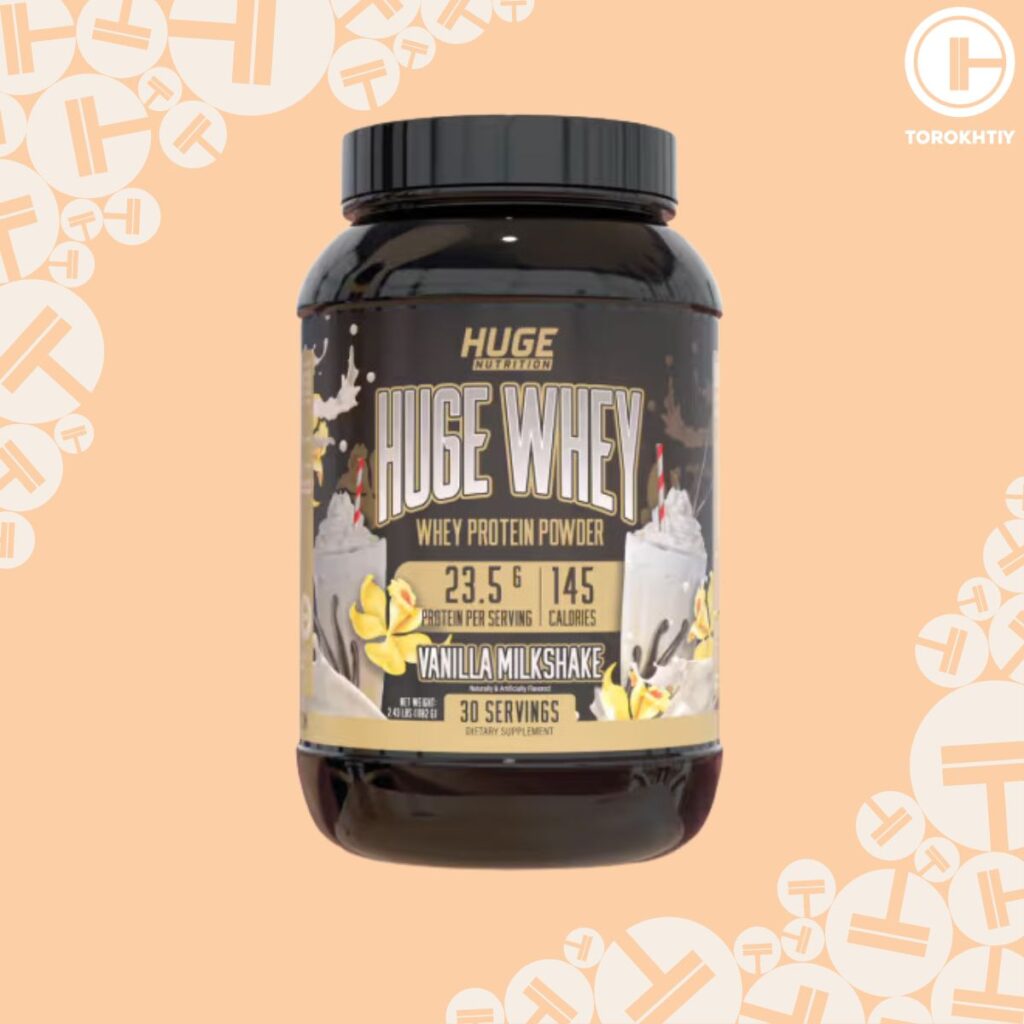
Still have questions after reading our article? Unlock your full potential by engaging with our experts and community! Don’t hesitate — leave a comment below and Oleksandr Maksymenko will provide a personalized answer and insights to help you reach your goals.